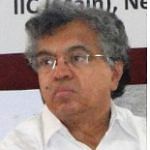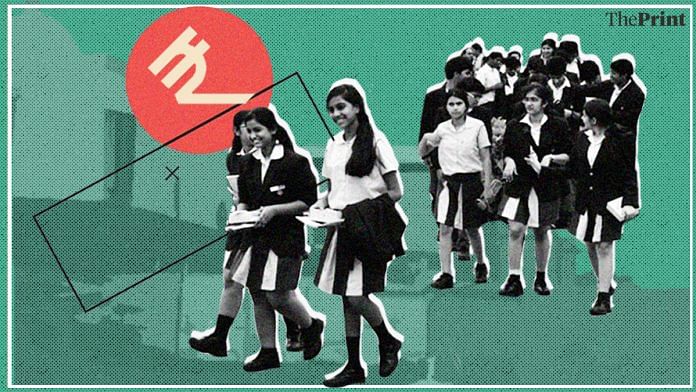More parents are enrolling their children in private schools instead of those run by government, according to data shared by the Ministry of Human Resource Development. Student enrolment in public schools came down from 19.9 crore in 2011-12 to 18.9 crore in 2016-17.
ThePrint asks: Rise in private school admission: How can state govts restore faith in public education?
Maharastra & Rajasthan are seeing reverse trend — students are moving from private schools to govt schools
 Anil Swarup
Anil Swarup
Former Secretary, Department of School Education and Literacy
There is a rise in private school enrolment and a clamour for it for the simple desire to learn English. There is a market demand for the language, which is why in rural areas there are convent schools. These schools are so popular because they teach English, even though the quality of it is debatable. Government schools shy away from stating that they teach English. To add to this, there is an absence of teachers and the quality of education is not up to the mark.
However, this can easily be handled by improving the quality of education in government schools. This has been witnessed in the state schools in Rajasthan and Maharashtra, where there is a reverse trend — students are moving from private schools to government schools.
So, state governments can most definitely restore faith in public education. state governments can most definitely restore faith in public education.
Also read: Sharp rise in number of students opting for private schools, even in poor states
Despite failures, education is too important a sector for the state to exit entirely
 Prithvi Datta Chandra Shobhi
Prithvi Datta Chandra Shobhi
Professor, Krea University
There are many reasons as to why private schools are succeeding in weaning away students from government schools. Two main reasons seem to be that most private schools offer English medium education and their lesson planning is relatively better. Apart from these two factors, parents also appear to be more confident demanding accountability from private schools in ways they do not from government schools.
While English medium education isn’t a prerequisite to provide good quality education, state education departments across India simply haven’t succeeded in reforming public education. Although paid quite well, government school teachers are saddled with a whole range of administrative responsibilities. Some of these responsibilities such as midday meal for children may prove consequential in extending the cause of education. But the bulk of their additional responsibilities, like preparing electoral rolls or assisting in Census operations, have not much to do with their day job. More significantly, these teachers aren’t well versed in lesson planning or in preparing additional curricular activities to make the learning process more interesting. They also have never been trained or motivated to assess student needs and work autonomously.
Despite these failures, education is too important a sector for the state to exit entirely. Not only does the state need to manage and regulate education sector effectively, it also should be ready to make necessary investment in places as well as forms of education in which private education will not enter. Note that the cause of public education enjoys tremendous civil society support and the government needs to leverage that to bring about changes in public schools.
Govt schools must ensure that learning takes place in a mixed environment
 Anita Rampal
Anita Rampal
Professor, Elementary and Social Education, Delhi University
What government schools mainly need to focus on is equitable quality of education. There is a need to understand what this means. If you are trying to do what the Delhi government is doing – segregating children based on their learning skills and the kind of government schools they go to – then that will not benefit children.
Governments in Kerala and Karnataka are witnessing a reverse trend where students are moving from private schools to government schools. This is because children are being taught in their first language – this ensures better learning prospects because children absorb and understand more. Having English as the medium of instruction is not a guarantee for quality education or improved learning. Also, education is not only about weekly tests and securing good marks.
Government schools have children largely coming from marginalised or disadvantaged sections of society. It would help children more if pedagogy and learning take place in a mixed environment. State governments can restore the faith in public education if right policies are followed and the environment for learning is more student-friendly.
The goal should be to improve every school & not just look at a change in average performance levels
 R. Govinda
R. Govinda
Former Vice Chancellor, National University of Educational Planning
The main reason behind students moving from government to private schools is the perceived inefficiency of the public schools even though many of the private schools are no better. Restoring trust in public education system requires us to pursue a comprehensive long-term transformative agenda. Short-term projects getting abandoned or changed with the change in government won’t help.
Many of the reform measures taken up in recent years have focused on system-wide inputs, which get dissipated by the time they reach the school. This has to change. The focus has to be on the functioning of schools, their academic, physical infrastructure, teaching-learning process, and developing sound leadership.
The goal should be to improve every school and not just look at average performance levels. Every school that witnesses a change will have a demonstration effect on the neighbouring schools. Public examination and test performance of children tell us the malady but do not suggest remedial action. Improving the situation demands that we invest more in enhancing the quality of teachers and establishing a proper supervision system. It is only the teachers who can change what happens in a school. There is no standard strategy. Solution lies in enabling those directly linked with each school to envision and implement change and improvement in a contextual manner.
Also read: Playschools to be made mandatory as Modi govt wants no child ‘left behind’
State govts need to provide proper infrastructure, trained teachers & good English education
 Kritika Sharma
Kritika Sharma
Special correspondent, ThePrint
More Indian parents are sending their children to private schools instead of government ones because citizens seem to have lost faith in government institutions. In order to make sure that the enrolment goes up in public schools, state governments need to ensure that they provide three things: proper infrastructure, well-trained teachers and ensuring that children get to learn English.
Absence of trained teachers is where most public schools lag behind and private schools get an edge. Other than this, the general perception that private schools will teach children to speak better English also makes people send their children there. If state governments make sure that children get an environment where they get to learn to speak in English, they will be at an advantage, something that Delhi government started in its schools a year back.
Apart from these factors, getting students into schools at an early age by starting nursery classes in all government schools will be a good way to make sure that students stick with the school for a longer period of time. In fact, early childhood education is something that Narendra Modi-led government has been focusing on.
By Revathi Krishnan and Fatima Khan




In government schools we have better infrastructure comparing to private institutions,for example Chennai corporation schools have better infrastructure,and even the teachers are well trained and they work very hard for the upliftment of students,only the drawback children are from poor families,their parents are not well educated to the efficiencies like spoken English,apart from school work some social institutions should show interest to develop their abilities and assure them to competite in the society,there are institutions in govt to be praised,there are hard working teachers praise them and encourage them,give your hands to poor,they are capable of doing things better than our expectations,we have an example Dr.Abdul Kalam
This is one cat that should be judged only by its ability to catch mice. There is no need to feel defensive or apologetic. Learning outcomes in government schools are being mapped each year. They are firing an Exocet missile through the hull of India’s demographic dividend. BMC schools are shutting down for want of students. Less well off families should receive monetary support to send their children to good private schools. They should be made proficient in English, use of computers, prepared to compete better.